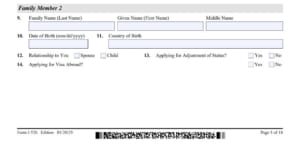In U.S. immigration matters, a visa is a document that allows a foreign national to enter the United States for a specific purpose, such as tourism, work, study, family visits (a nonimmigrant visa) or to immigrate (an immigrant visa). It is typically a stamp or sticker placed in the foreign national’s passport by a U.S. consulate or embassy.
A visa stamp refers to the physical impression or mark placed directly onto a passport page. It contains important information such as the visa holder’s name, passport number, visa classification (e.g., B-1/B-2 for business/tourism or F-1 for a student), and expiration date.
A visa foil, on the other hand, refers to the physical adhesive visa document that’s affixed to a passport page. It’s essentially the visa sticker itself, which contains similar information to the visa stamp. The visa foil is named after older visa material which had a consistency and look of (aluminum) foil but this material is no longer used.
Both the visa stamp and visa foil serve as evidence that the holder has been granted permission to travel to the U.S. to seek admission for a specific purpose and for a specified period. They are necessary for border officials to determine the traveler’s eligibility to enter the country. Without a valid visa, admission into the U.S. may be denied, except for citizens of countries that participate in the Visa Waiver Program (VWP), who can travel to the U.S. for tourism or business for up to 90 days without obtaining a visa.
If you have any questions about U.S. visas or U.S. immigration, contact us at info@enterlinepartners.com and speak with a U.S. immigration attorney in Ho Chi Minh City, Manila and Taipei.
ENTERLINE & PARTNERS CONSULTING
Ho Chi Minh City, Vietnam Office
146C7 Nguyen Van Huong St, Thao Dien Ward,
District 2, Thu Duc City
Ho Chi Minh City, Vietnam
Tel: +84 933 301 488
Email: info@enterlinepartners.com
Facebook: Enterline & Partners – Dịch vụ Thị thực và Định cư Hoa Kỳ
YouTube: @EnterlineAndPartnersConsulting
Website: http://enterlinepartners.com
Manila, Philippines Office
Tel: +63 917 543 7926
Email: info@enterlinepartners.com
Facebook: Enterline and Partners Philippines
Website: https://enterlinepartners.com/language/en/welcome/
Copyright 2024. This article is for information purposes only and does not constitute legal advice. This article may be changed with or without notice. The opinions expressed in this article are those of Enterline and Partners only.




